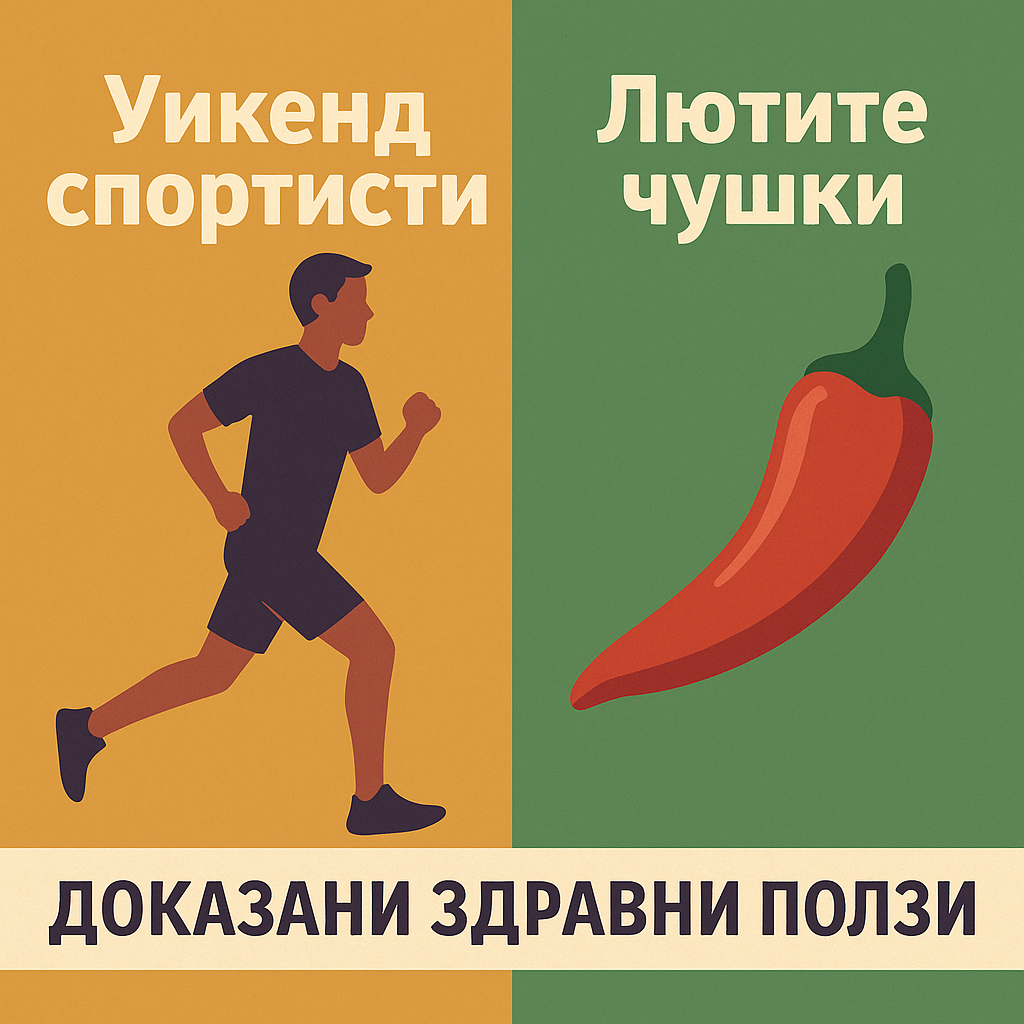Scientifically Proven Benefits of Weekend Workouts – and Other Surprising Discoveries for a Healthier Life
Anyone striving for a healthy lifestyle knows the importance of movement and a balanced routine. But what happens if you don’t have time for daily exercise? The good news: scientific health research shows that even so-called "weekend workouts" can bring significant benefits. In this article, we’ll explore the science-backed advantages of weekend training and a few other surprising discoveries that may change the way you think about healthy living.

The Benefit of Weekend Workouts: What Does the Science Say?
Even regular walks on the weekend count as beneficial physical activity. A recent large-scale study involving over 93,000 people in the UK found that so-called "weekend warriors" – people who exercise intensively only one or two days per week – gain similar health benefits to those who exercise moderately every day. The results are impressive: compared to sedentary participants, weekend exercisers had:
-
32% lower risk of all-cause mortality
-
31% lower risk of death from cardiovascular diseases
-
21% lower risk of death from cancer
These numbers scientifically prove that even concentrated weekend physical activity significantly improves health. Researchers emphasize that the key to health is reaching the recommended 150 minutes of moderate to vigorous physical activity per week – no matter how you distribute those minutes. In other words, what matters is the total amount of movement.
This is encouraging news for people with busy schedules who struggle to find time for exercise every day. Instead of feeling guilty for not working out during the week, you can catch up over the weekend and still gain health benefits.
Of course, there’s a practical caveat. Experts advise “weekend warriors” to be cautious and not overload the body suddenly. Proper warm-up and gradual intensity increase reduce the risk of muscle and joint injuries. That way, you can enjoy all the benefits of weekend exercise without unpleasant consequences.

More Surprising Discoveries for a Healthy Lifestyle
Scientific studies continue to surprise us with new findings about how small changes in our daily routine can improve our health. Here are a few more interesting discoveries backed by research.

Short Intense Workouts – Big Gains in Little Time
Did you know that even a few minutes of vigorous movement per day can make a noticeable difference in your health? According to recent studies, just 15–20 minutes of high-intensity physical activity per week (about 3–4 minutes per day) is linked to around 30% lower risk of premature death.
Increasing to 20 minutes of intense activity per week can reduce the risk of heart disease by up to 40%. Surprisingly, these minutes don’t have to be accumulated all at once – even brief 1-2 minute intervals of high-intensity effort during daily activities contribute to health benefits.
This means that taking the stairs quickly, running after the bus, or doing vigorous house cleaning can count as mini-workouts. The key is intensity – when you get out of breath and your pulse rises, your body gets a workout, even if it lasts just a minute or two.
This discovery is especially valuable for people who “don’t have time” to exercise. There’s no more excuse – everyone can include a few short bursts of movement during their day. For example, try doing 2–3 quick sets of jumping jacks, burpees, or fast walking. The cumulative effect of these micro-workouts can be just as beneficial as longer sessions when it comes to improving health and reducing heart risks.
Hot Peppers – A Spicy Recipe for Longevity
Hot pepper lovers might have an edge when it comes to living longer. It turns out that your taste for spicy food may have an unexpected health benefit. A major meta-analysis presented by the American Heart Association, covering over half a million people worldwide, found compelling correlations:
-
Regular consumption of hot peppers is associated with a 25% lower risk of death from all causes.
-
Spicy food lovers have a 26% lower risk of dying from cardiovascular diseases and a 23% lower risk of death from cancer – a rather surprising link that has caught scientists’ attention.
Why would hot peppers extend life? The exact mechanism is still under study, but researchers suggest a few possible explanations. Hot peppers contain capsaicin, the compound that gives them their spiciness. Capsaicin has anti-inflammatory, antioxidant, and even anticancer properties and may help regulate blood sugar levels.
These effects could explain some of the observed benefits – reducing inflammation and oxidative stress in the body is key to preventing many chronic diseases. Of course, more studies are needed to confirm a cause-effect relationship, but the discovery is certainly intriguing. So, if you love spicy food, enjoy – besides flavor, it may offer you a healthy bonus too.

Final Thoughts: Science Continues to Surprise Us
As you can see, science keeps uncovering new and sometimes unexpected facts about healthy living. Weekend workouts turn out to be an effective approach for busy people, short daily "sprints" bring major benefits, and even habits like eating spicy food may contribute to better health.
These are great news – small changes can lead to big results. It’s important to stay informed and apply evidence-based strategies for better health.

👉 Share these surprising facts with friends, comment below with your experience or opinion, and don’t forget to subscribe to DrGoGo for more practical tips and exciting discoveries! Your health is in your hands – even if you only have time on the weekend, it turns out that’s more than enough to make a positive change.
Sources:
Kany S, Al-Alusi MA, Rämö JT, Pirruccello JP, Churchill TW, Lubitz SA, Maddah M, Guseh JS, Ellinor PT, Khurshid S. Associations of "Weekend Warrior" Physical Activity With Incident Disease and Cardiometabolic Health. Circulation. 2024 Oct 15;150(16):1236-1247. doi: 10.1161/CIRCULATIONAHA.124.068669. Epub 2024 Sep 26. PMID: 39324186; PMCID: PMC11803568.
Min J, Cao Z, Duan T, Wang Y, Xu C. Accelerometer-derived 'weekend warrior' physical activity pattern and brain health. Nat Aging. 2024 Oct;4(10):1394-1402. doi: 10.1038/s43587-024-00688-y. Epub 2024 Aug 21. PMID: 39169268.
Ning Y, Chen M, An J, Tang M, Tse G, Chan JSK, Zhao C, Liu Y, Lei X, Qiang H, Bai C, Li H, Yu H, Yan Y, Wang D, Li G. Association between "weekend warrior" physical activity and the incidence of neurodegenerative diseases. Neurotherapeutics. 2024 Sep;21(5):e00430. doi: 10.1016/j.neurot.2024.e00430. Epub 2024 Aug 10. PMID: 39129094; PMCID: PMC11579868.
Cao Z, Min J, Xu C. Accelerometer-derived "weekend warrior" physical activity pattern and incident type 2 diabetes. Cardiovasc Diabetol. 2025 Mar 21;24(1):130. doi: 10.1186/s12933-025-02676-x. PMID: 40119320; PMCID: PMC11929297.
Mahe J, Xu A, Liu L, Hua L, Tu H, Huo Y, Huang W, Liu X, Wang J, Tang J, Zhao Y, Liu Z, Hong Q, Ye R, Hu P, Jia P, Huang J, Kong X, Ge Z, Xu A, Wu L, Du C, Shi F, Cui H, Wang S, Li Z, Wang L, Zhang L, Zhang L. Association between weekend warrior physical activity pattern and all-cause mortality among adults living with type 2 diabetes: a prospective cohort study from NHANES 2007 to 2018. Diabetol Metab Syndr. 2024 Sep 12;16(1):226. doi: 10.1186/s13098-024-01455-0. PMID: 39267148; PMCID: PMC11391736.
You D, Sun D, Zhao Z, Song M, Pan L, Wu Y, Tang Y, Lu M, Shao F, Shen S, Bai J, Yi H, Zhang R, Wei Y, Ma H, Xu H, Yu C, Lv J, Pei P, Yang L, Chen Y, Chen Z, Shen H, Chen F, Zhao Y, Li L; China Kadoorie Biobank Collaborative Group. Spicy food consumption and risk of vascular disease: Evidence from a large-scale Chinese prospective cohort of 0.5 million people. Chin Med J (Engl). 2024 Jul 19. doi: 10.1097/CM9.0000000000003177. Epub ahead of print. PMID: 39030074.
Li J, Xie C, Lan J, Tan J, Tan X, Chen N, Wei L, Liang J, Pan R, Zhu T, Pei P, Sun D, Su L, Zhou L. Spicy food consumption reduces the risk of ischaemic stroke: a prospective study. Br J Nutr. 2024 May 28;131(10):1777-1785. doi: 10.1017/S0007114524000229. Epub 2024 Jan 30. PMID: 38287709.



Comments